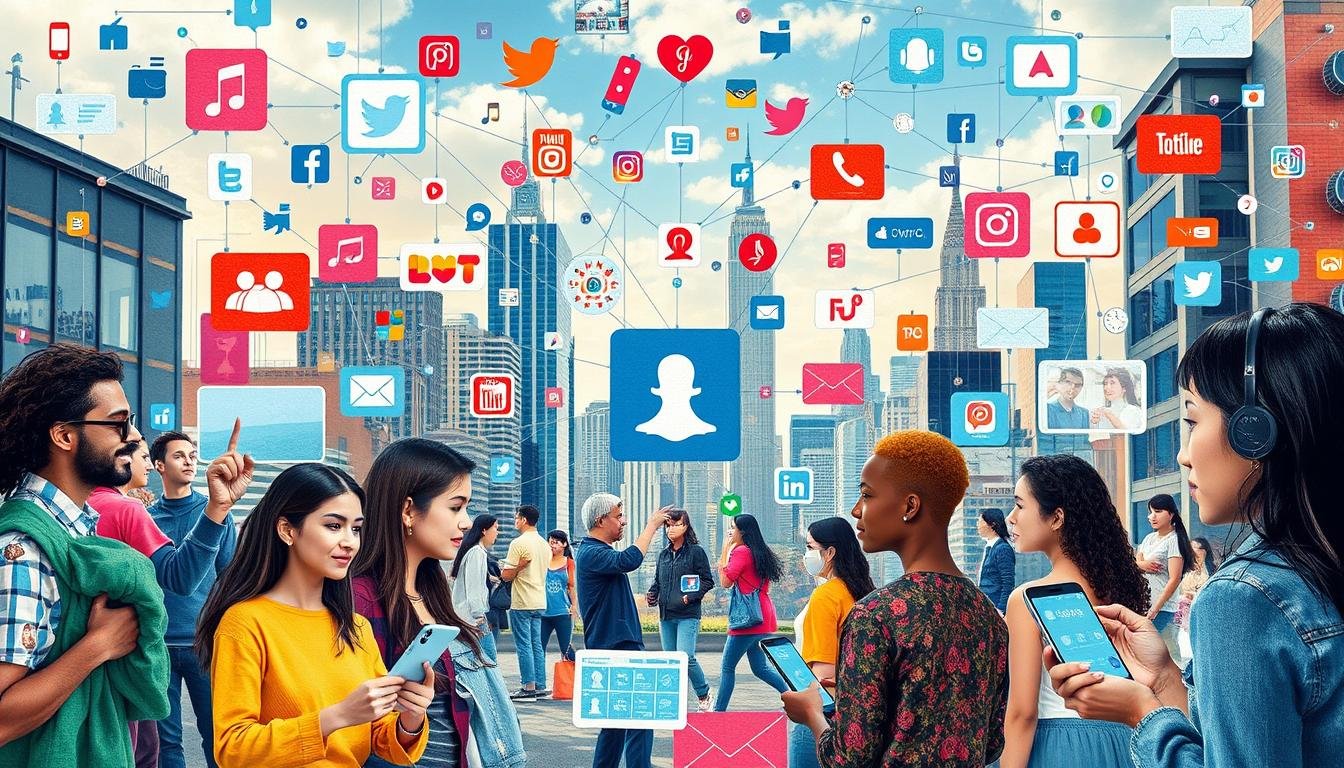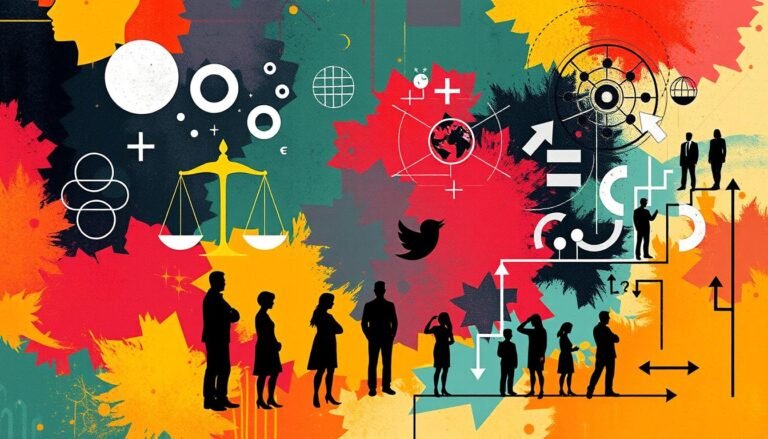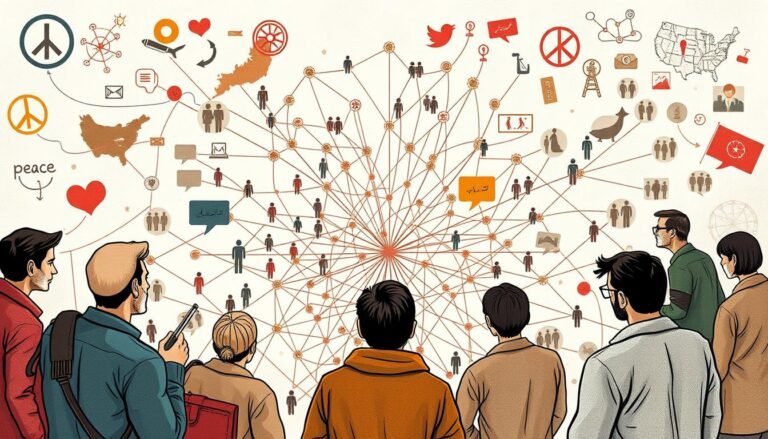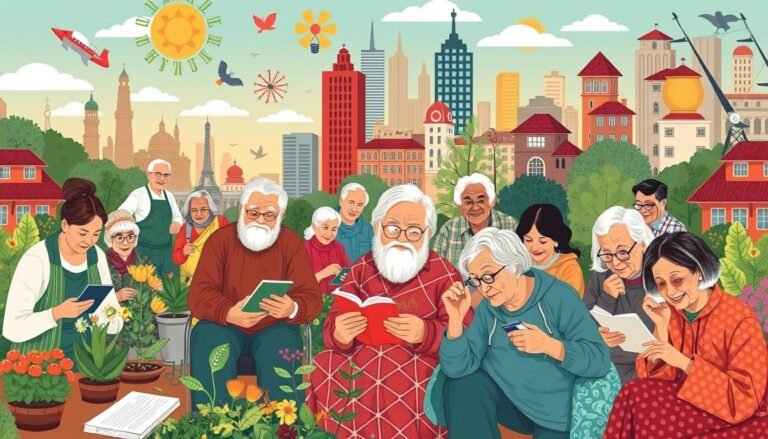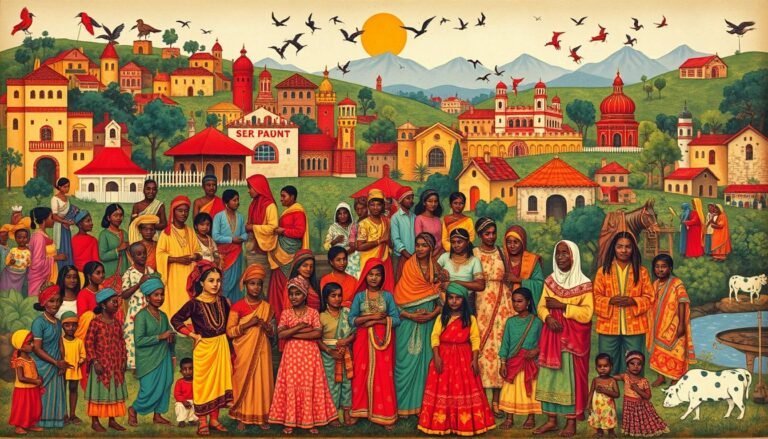Understanding the Sociology of Social Media
Have you ever thought about how social media has changed our society? It’s important to look at how social media and society are connected. These platforms are key to our digital communities today.
Social media has changed how we connect, talk, and share info. It’s not just about tech; it’s about people and how they interact. The success of sites like Facebook, Twitter, and Instagram comes from the human connections they support, not just their looks.
These online communities act like global villages. They let us keep up with friends and make new ones easily. Social media makes the world feel closer and easier to reach.
But social media does more than help us stay in touch. It also shapes our actions, affects our choices, and can impact our mental health. How we act online, what we see, and who we talk to shapes our digital and real-life identities.
Key Takeaways
- Social media’s success is based on human connections, not just tech
- These platforms make global connections and quick communication possible
- Our online actions greatly influence our behavior and choices
- Social media mirrors and molds societal norms and cultural diversity
- Knowing about social media sociology helps us navigate today’s digital world
The Evolution of Social Media and Its Sociological Impact
Social media has changed how we interact and live. It’s important to understand its growth and the big changes it has made in our lives.
From ARPANET to Web 2.0: A Brief History
ARPANET started in 1969, the beginning of social media. As technology got better, sites like LinkedIn in 2002 and Facebook in 2004 changed how we connect. By 2019, 72% of American adults used social media, a big jump from just 5% in 2005.
The Rise of Digital Sociology
In 2009, ‘digital sociology’ became a thing, starting a new chapter in understanding technology’s impact. This field looks at how digital platforms change our behavior and social groups. For example, Facebook’s 1.7 billion users worldwide have changed how we share information and connect with others.
Social Media’s Role in Shaping Modern Society
Social media is now a big part of our lives, affecting everything from our personal relationships to big movements. TikTok, which started in 2016, quickly got over 800 million users by 2020. This shows how fast new social tech can spread.
| Platform | Launch Year | Users (Millions) | Key Impact |
|---|---|---|---|
| 2002 | 675+ | Professional networking | |
| 2004 | 1,700+ | Global connectivity | |
| 2006 | 330+ | Real-time news sharing | |
| TikTok | 2016 | 800+ | Short-form video culture |
The study of social media’s impact is always changing. It helps us understand digital interactions and their effects on society. As new platforms come and go, they leave marks on how we talk, work, and see the world.
Understanding the Sociology of Social Media
Social media has changed how we connect with each other, creating a new area for study. These digital spaces let us keep up with friends and family all over the world. They look at how our online actions affect our behavior, relationships, and society.
Research shows that using social media makes people happier. This shows our deep need to connect with others, affecting our personal and work lives. These platforms help companies build trust with customers through real conversations.
Social media does more than just connect people. It has changed politics worldwide, changing how we talk to each other and who has power. People with a big online presence can now influence society more, changing old ways of doing things.
“Social media’s success relies on sociology rather than the sophistication of technology’s user experience.”
Looking into social media’s effects on us shows how our minds work online. Users act differently, both on purpose and not on purpose, when they’re online. Sites like Facebook and YouTube now focus on making time spent online meaningful, trying to get users to interact more.
| Social Media Aspect | Sociological Impact |
|---|---|
| Global Connectivity | Maintenance of relationships worldwide |
| User Engagement | Increased satisfaction and fulfillment |
| Political Movements | Reshaping of power dynamics |
| Business Interactions | Building rapport and trust with customers |
It’s important to understand social media’s impact on our society. With so many users, social media’s effect on us and our social structures is a key area of study. Sociologists and researchers find it very interesting.
The Intersection of Technology and Human Behavior
Social media has changed how we connect and share ourselves. It has given us new ways to meet our basic needs. This has changed our social world.
How Social Media Fulfills Basic Human Needs
Now, 70% of U.S. adults use social media, up from just 5% in 2005. These platforms let us express ourselves and build communities like never before.
The Psychology Behind Online Interactions
Online chats are different from talking face-to-face. In 2016, high school seniors spent an hour less on in-person social time than in the late 1980s. This shows how digital media is becoming a big part of our lives.
Virtual Identities and Self-Presentation
Social media lets us explore and show who we are. Teens talk more about their sexuality online and work on their identities on blogs and social networks. Visual platforms help them try out different identities, but we don’t know the long-term effects yet.
| Social Media Usage | Percentage |
|---|---|
| Teens using social media | 81% |
| Teens accessing social media multiple times hourly | 33% |
| Teens encountering hate content | 66% |
| Teens valuing social media for creativity expression | 25% |
As we blend our online and offline lives, it’s important to understand the effects of social media. It’s changing how we form identities and interact with others. This is a key topic for research and conversation.
Social Network Analysis in the Digital Age
Social network analysis has grown a lot since the 1960s. Now, it’s key to understanding how we connect online. It uses stats and virtual watching to find patterns in our connected world.
Researchers look at how digital groups form and talk to each other. They study online relationships to see how people connect and group. This helps us understand how news spreads, opinions form, and social rules come about online.
One cool thing about social network analysis is how it links online and real life. Studies show that online friendships can also be real-life friends. This mix of online and offline connections makes a deep world for sociologists to study.
“Social network analysis provides an overarching research context for scholars, policy makers, industry, and the public sector.”
The rise of big data has changed social network analysis a lot. Now, researchers can look at huge amounts of info from social media. But, this big data brings challenges like privacy issues and needing better tools to analyze it.
As we move forward in the digital age, social network analysis will keep being important. It gives us deep insights into how digital groups work and interact. This helps us understand modern social connections better.
The Impact of Social Media on Relationships and Communities
Social media has changed how we connect and talk to each other. Over 90% of adults worldwide own smartphones, making these platforms a big part of our lives. This change has affected everything from our personal relationships to how communities work.
Strengthening Existing Ties and Forming New Connections
Social media is great for keeping up with friends and family who live far away. About 80% of users use these platforms to stay in touch. Facebook is a big example, with 1.5 billion people using it every day. It’s especially popular with young people in America, with 71% of teens using it often.
The Debate on Social Capital in the Digital Era
There’s a lot of talk about how social media affects our social connections. While it helps us connect, about 45% of users feel like their relationships online are shallow. This makes us wonder about the quality of our online chats and how they affect our real-life connections.
Online Subcultures and Virtual Communities
The internet has created many online groups and communities. These places let people meet others who share their interests, no matter where they live. These virtual groups often mix online and offline life, creating new ways of connecting.
- 60% of users carefully curate their online image
- 70% of young users feel pressured to maintain a polished social media presence
- 50% of online activists don’t engage in real-world actions
As social media keeps changing, its effects on our relationships and communities will keep being studied and talked about.
Social Media’s Influence on Societal Structures
Social media changes how we see society. It makes digital platforms powerful for changing who has power and letting more voices be heard. This change is seen in places like Libya, Egypt, and Tunisia, where social media helped people come together.
Studies show that groups on social media have a bigger impact than one person speaking out. These groups often stand up for women’s rights and equality. They also teach their kids about equality and stop violence at home.
Social media does more than just change how we talk to each other. It changes how we feel connected to others and what we think. It lets us see what’s happening in different places and communities.
“Well-functioning communities are a pre-condition for building healthier democracies.”
But, social media isn’t always good. It can make people stick to their own groups and make public talks harder. Seeing mean or racist words online can make people support harmful actions. This shows how complex social media is in our lives today.
Challenges and Concerns in the Social Media Landscape
Social media and society face big challenges today. The digital divide means not everyone can access it equally. Privacy concerns and data breaches threaten user safety. False information spreads quickly, shaping public opinion.
Digital Divide and Inequality
Not everyone can use social media the same way. This gap makes existing inequalities worse. In 2010, young people spent over 10 hours a day with media. Yet, many still don’t have the internet at all. This affects their education, jobs, and social connections.
Privacy Issues and Data Security
Social platforms gather a lot of user data. When this data gets leaked, personal information is at risk. Users often don’t know how their data is being used. This makes people question the safety of the internet and trust in tech companies.
The Spread of Misinformation
False news moves fast on social media. It affects views on health, climate, and politics. Groups against vaccines and climate action gain followers. This weakens trust in experts and science. Social networks must find a way to balance free speech with checking facts.
“The presence of social media has challenged democratic principles by substituting coherent discussions with fragmented ideas and spreading populism.”
We need ongoing research and policy work to tackle these issues. Finding a balance between innovation and safety is crucial for social media’s future impact on society.
The Future of Social Media and Sociological Research
Social media is changing fast, and so is the way we study it. Facebook has 1.97 billion users every month, and Snapchat sees about 400 million snaps daily. These numbers show how big a role digital sociology plays in our lives today.
New tech like wearable devices, augmented reality, and the Internet of Things will change how we interact online. Sociologists are updating their methods to keep up. They’re now using big data and machine learning to study online activities. This helps them spot trends and predict changes on a huge scale.
The future of studying social media will involve working together across different fields. For example, medical sociology looks at how social factors affect health. Environmental sociology studies how societies and the environment interact. These areas show how sociologists can tackle complex issues by working together.
Sociologists face big challenges and chances as social media shapes our world. They need to think about ethics, protect privacy, and handle sensitive info carefully. By tackling these challenges, sociologists can deepen our understanding of our digital world. They can also help shape its future.
Source Links
- Sociology and Social Media
- Sociology of Social Media
- Understanding Social Media Literacy: A Systematic Review of the Concept and Its Competences
- The Evolution of Social Media: How Did It Begin, and Where Could It Go Next?
- Social Media Impact: How Social Media Sites Affect Society
- Twenty-Five Years of Social Media: A Review of Social Media Applications and Definitions from 1994 to 2019
- Sociology’s Role in Social Media
- Frontiers | Understanding Detrimental Aspects of Social Media Use: Will the Real Culprits Please Stand Up?
- Social media’s growing impact on our lives
- No title found
- Social Network Analysis in an Age of Digital Information
- Social Network Analysis in a Digital Age
- Social Media Use and Its Impact on Relationships and Emotions
- Social Media and Society: A Sociological Perspective
- How Does Media Influence Social Norms? A Field Experiment on the Role of Common Knowledge.
- Reviewing the Evidence on Social Media and Social Cohesion | TechPolicy.Press
- The Impact of Social Media on Society – Master Sociology
- Social Media Effects: Hijacking Democracy and Civility in Civic Engagement
- Frontiers | Researching Social Networks: Opportunities and Challenges
- Social Media and Mental Health: Safety in the Digital Age? — Divided We Fall
- Advances in Social Media Research: Past, Present and Future – Information Systems Frontiers
- Section 8.5: The Future of Sociological Research
- The negative effects of social media on the social identity of adolescents from the perspective of social work

